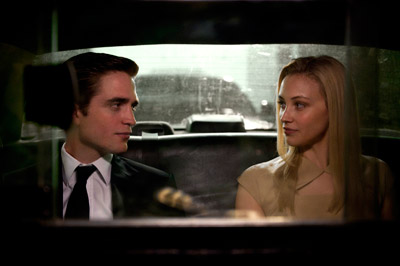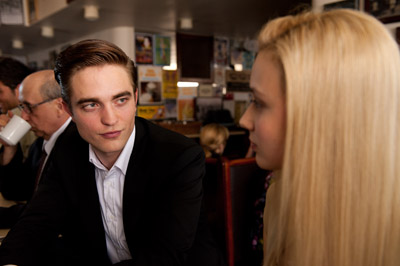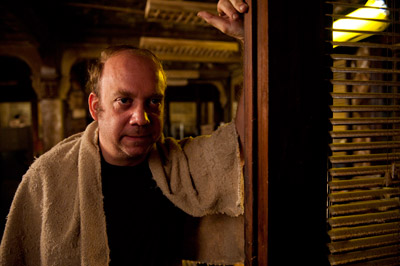Don DeLillo Cosmopolis Interview

Don DeLillo Cosmopolis Interview
Cast: Robert PattinsonDirector: David Cronenberg
Genre: Drama
Running Time: 108 minutes
Synopsis: New York City, not-too-distant-future: Eric Packer, a 28 year-old finance golden boy dreaming of living in a civilisation ahead of this one, watches a dark shadow cast over the firmament of the Wall Street galaxy, of which he is the uncontested king. As he is chauffeured across midtown Manhattan to get a haircut at his father's old barber, his anxious eyes are glued to the yuan's exchange rate: it is mounting against all expectations, destroying Eric's bet against it. Eric Packer is losing his empire with every tick of the clock.
Meanwhile, an eruption of wild activity unfolds in the city's streets. Petrified as the threats of the real world infringe upon his cloud of virtual convictions, his paranoia intensifies during the course of his 24-hour cross-town odyssey. Packer starts to piece together clues that lead him to a most terrifying secret: his imminent assassination.
Release Date: August 2nd, 2012
For more interviews see:
David Cronenberg Cosmopolis Interview
Robert Pattinson Cosmopolis Interview
Interview with Don DeLillo
Question: How did the project to adapt Cosmopolis come about?Don DeLillo: I wasn't behind it. In 2007, Paulo Branco invited me to take part in the Estoril Film Festival, which he coordinates in Portugal. He likes to have people from outside the cinema industry, such as writers, painters or musicians, to sit in the jury, and it is indeed a very pleasant experience to talk about films that way. On this occasion, he told me about the project; actually, it was his son Juan Paulo's idea in the first place. He had already optioned the rights to the book. I knew his career as a producer, the impressive list of great filmmakers he has worked with, so I said yes. Then the question of the director arose, and I think Juan Paulo is again the one who suggested David Cronenberg. Next thing I knew, Cronenberg was on board and it was a done deal, in the best possible way. It all happened very quickly, actually.
Question: Did you read the script?
Don DeLillo: Yes I did, and it was incredibly close to the book. Of course, David Cronenberg cut out a few scenes that couldn't work out, but it is totally faithful to the spirit of the novel. Of course, I had no intention to make comments when I read it, it had become a David Cronenberg film. It is my novel, but it is his film, there is no question about it. Then, last March, I saw the film in New York once it was completed. I was really impressed. It is as uncompromising as it can possibly be. I liked it from the very beginning, from the opening credits: what an amazing idea to start with Jackson Pollock, and to finish with Rothko, for that matter. And the final scene, with Robert Pattinson and Paul Giamatti, is just mind-blowing!
Question: What did you think about adapting this very novel for the screen?
Don DeLillo: Throughout the years, there have been many proposals to adapt several of my books, but they have never come through. I thought that adapting Cosmopolis would be particularly tricky, since most action is confined within a car, which doesn't translate well to the screen. But not only did Cronenberg respect that, he also shot in the limo some scenes that originally happened elsewhere, like the sequence with Juliette Binoche, for instance.
 Question: There is a paradox about your books: although crammed with references to cinema, they seem impossible to adapt to the screen.
Question: There is a paradox about your books: although crammed with references to cinema, they seem impossible to adapt to the screen. Don DeLillo: You are right, but I just cannot explain it. I thought that Libra or White Noise could easily be turned into films, but apparently it is very complicated. I don't know why. Anyway, don't expect me to take care of it myself and write a screenplay.
Question: Cinema plays a large part in your books, but hardly ever by means of a reference to a particular film or filmmaker. It is more the idea of cinema than such or such model or personality.
Don DeLillo: Indeed, what matters is more a cinematographic sensibility than some films in particular. I grew up in the Bronx, we used to watch westerns, musicals, gangster flicks - at that time I didn't know what a film noir was. Then I moved in to Manhattan, and I discovered Antonioni, Godard, Truffaut, the great modern European directors, and also Japanese directors, starting with Kurosawa. To me it was a revelation: the magnitude of such films equalled that of the greatest novels! Many people think that in the 1960s I quit my job in an advertising company to write my first novel. Not at all: I just quit so I could go to the movies every afternoon. Only afterwards did I seriously take up writing.
Question: Then you wrote Americana, the story of a man who happens to quit his job in the media industry to direct a film…
Don DeLillo: Exactly! (He laughs) And since then, as I live close to New York, I keep discovering many new films that have become impossible to watch in a theatre anywhere else in the United States. At some point in my life I lived in Greece, for three years, and I was film-starved, many good films weren't shown there, I really missed it. Otherwise, I have kept a close look on what has been happening in the cinema industry, and I think that lately The Turin Horse by Bela Tarr, The Tree of Life by Terrence Malick or Melancholia by Lars von Trier have been real milestones.
 Question: In your novels, there aren't only numerous references to cinema, characters who want to make films, lost films or secret films, etc. There is something quite cinematographic in the narration itself, for instance the trajectory of the boy and the baseball at the beginning of Underworld is composed as a film sequence.
Question: In your novels, there aren't only numerous references to cinema, characters who want to make films, lost films or secret films, etc. There is something quite cinematographic in the narration itself, for instance the trajectory of the boy and the baseball at the beginning of Underworld is composed as a film sequence.Don DeLillo: It is because when I write, I need to see what is happening. Even when it is just two guys talking in a room, writing dialogues is not enough. I need to visualise the scene, where they are, how they sit, what they wear, etc. I had never given much thought about it, it came naturally, but recently I became aware of that while working on my upcoming novel, in which the character spends a lot of time watching file footage on a wide screen, images of a disaster. I had no problem describing the process, that is to say to rely on a visualisation process. I am not comfortable with abstract writing, stories that look like essays: you have to see, I need to see.
Question: You are Italian-American. Have you felt a particular kinship with the generation of great Italian-American directors that made its breakthrough in the 1970s, and with which you were contemporary?
Don DeLillo: I really liked Mean Streets. I grew up in the Bronx and Scorsese in Lower Manhattan, in Little Italy, but we shared the same language, the same accents and the same behaviours. Needless to say I was familiar with troublemakers like Robert De Niro's character, I even knew some of them very well. But the most significant experience probably dates back further. I was very young when I saw Marty by Delbert Mann, which takes place where I used to live, in the Italian part of the Bronx. The film was shown in Manhattan, so there were eight of us guys, packed in a car to go and watch it. The opening scene takes place in Arthur Avenue. It was our place! Seeing our street, the shops we patronised, there in a movie theatre, that was amazing. It was as if our very existence was acknowledged. We never would have thought that somebody would make a film in those streets.
Question: How did you react when you heard that David Cronenberg was to adapt your novel?
Don DeLillo: I was delighted. I missed a few of his earliest films, but at least since Dead Ringers, I have seen them all. I am particularly fond of Crash and ExistenZ, and of course A History of Violence. At first I wondered if it was the kind of material he usually worked with. I didn't think so, but I thought it could be a good thing, an opportunity for him to tackle the subject in an original way. Anyway I was sure he could make the content of the book visually stunning, in a way that would surprise everybody, including myself. I had no idea what he was up to, but I knew it wouldn't be conventional.
Question: Had you seen his version of Naked Lunch?
Don DeLillo: Yes, that's impressive! Exactly the kind of surprise I was hoping for regarding Cosmopolis.
Question: Was it when you met with David Cronenberg?
Don DeLillo: Yes, he was in Estoril as well. But we didn't talk much about the project to adapt the book, I wanted to keep out of it. We talked a bit about the fact that it would be shot mainly in Toronto, I could see that he knew what he was doing, and it was fine by me. We probably talked about the leading actor, but this person finally couldn't make it. Later on, when Paulo told me about Robert Pattinson, I thought that at last, my fourteen-year-old niece would look up to me.
Question: Did you visit the set?
Don DeLillo: No. I was offered to, but I didn't find it useful. I have already been on film sets, it's really boring. You spend most of your time waiting.
Question: Speaking of film location, New York is so important in the novel, weren't you somewhat worried to know that most of the shooting was to take place elsewhere?
Don DeLillo: The important thing is that it happens inside a limousine. It is like a world itself, with several intrusions of various kinds, visitors, or an angry mob. This is what really matters. Besides, shooting elsewhere gives the film a more general dimension, of course it is New York, but it is more the idea of "the great contemporary city" we are dealing with, which is perfectly fine.
Question: The book was published in 2003, the film will be released in 2012, weren't you afraid that this interval was going to be a problem?
Don DeLillo: Interestingly enough, when the film was almost done, the "Occupy Wall Street" movement came out, somewhat striking a chord with what the film is about. I think it is only the beginning, there is going to be more of it. Vija Kinski, Eric Packer's Chief of Theory (played by Samantha Morton in the film), explains to her boss that those protesters are the direct offspring of Wall Street and capitalism, and that they contribute to refresh and readjust the system. They help Wall Street redefine itself in the face of a new context and a bigger world. In my opinion, this is precisely what is happening: "Occupy Wall Street" hasn't reduced the astronomical bonuses raked in by corporate executives.
Question: What was your reaction when you first saw the film? Did you find new elements that weren't in the book?
Don DeLillo: I was thrilled. There are also very funny moments, and I was really impressed by the whole ending, it takes the film to another level. What happens between Eric Packer and Benno Levin, the character played by Paul Giamatti, is marked by their mutual respect, something that was in the book but which is more palpable in the film. Indeed, David made the right decision in cutting two interventions by Benno Levin before they meet. Those two inserted chapters fitted the novel, not the film.
Question: The dialogues are almost all yours. How does it feel to hear them?
Don DeLillo: It is the strangest thing! These are my words, but they take on another life. I wrote this conversation about art that Eric and the character played by Juliette Binoche have, but somehow it felt like I was discovering it, or even understanding it for the first time.
Question: One of the most important aspects of the book is the way things, and the words assigned to them, become outdated and are left behind, following a process of accelerated obsolescence. Packer keeps saying "does this thing still exist?", "how can we still use such a word?", "'computer', it's such a dated word", etc.
Don DeLillo: That's true, and in the novel he has a particular perception of time which projects him ahead, he sees what is going to happen next. This aspect has almost disappeared from the film. For this book, I paid much attention to time, to the way money shapes our perception of time. They say "time is money", but in this context, money is time. This idea is also in the film, only in different ways.
Question: Your name appears in the closing credits for a song in the movie.
Don DeLillo: Yes, I noticed that! It is because of the lyrics I wrote for the Sufi rapper in the book, which were also used in the film. This launches the beginning of a new career for me as a rap lyricist… I couldn't be any prouder.
MORE
- Emma Stone Magic in the Moonlight
- Jessica De Gouw Cut Snake
- Maxine Peake Funny Cow
- Denzel The Equalizer 2
- Johnny Flynn Beast
- Logan Marshall Green Upgrade
- Shailene Woodley Adrift
- Eric Toledano and Olivier Nakache C'est La Vie...
- André Leon Talley The Gospel According To André...
- Shakespeare In Tokyo
- Mission: Impossible Fallout
- Glenn Close The Wife
- Allison Chhorn Stanley's Mouth Interview
- Benicio Del Toro Sicario: Day of the Soldado
- Dame Judi Dench Tea With The Dames
- Sandra Bullock Ocean's 8
- Chris Pratt Jurassic World: Fallen Kingdom
- Claudia Sangiorgi Dalimore and Michelle Grace...
- Rachel McAdams Disobedience Interview
- Sebastián Lelio and Alessandro Nivola...
- Perri Cummings Trench Interview



